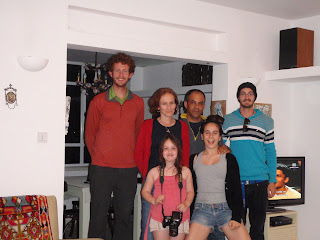We had set up a meeting to volunteer with Noam Dotan, co-founder of COMETME.org, At his workshop in Bet Shemesh, a town between Tel Aviv and Jerusalem. So we woke up early, put the Mediterranean to our backs, and traveled East by bus and train towards Jerusalem. Noam met us at the train station and brought us to his beautiful property along a ridge line looking East into the West Bank. COMETME is a small Israeli nonprofit which builds and installs hybrid, clean-energy power plants for off the grid communities in the Southern West Bank. The hybrid systems rely on a mix of wind and solar energy to charge batteries which the communities use to power all number of electronics.


Noam, a retired physicist, and renowned tinkerer, began by showing us around his workshop, which has two small windmills, one is electric, and the other a water pump, solar panels, an incredibly friendly shepherd/ collie mix named Nanya, and a multitude of homemade whirligigs. We chatted about the projects that COMETME is now undertaking, and learned an incredible amount about the way windmills work. We soon learned that we would be helping him construct a 4.2 meter diameter (13 feet!) windmill over the course of the day. We began by winding copious amounts of coated copper wire into neat little coils. These coils will be part of the stator, where energy from moving magnets attached to the windmill blades creates an electrical current through all these copper wires.
I had mentioned that I knew my way around power tools, so Noam set me to grinding and shaping two parts of the windmill frame to be welded together, while Adrian began disassembling an automotive bearing joint which would form the rotor to which the blades would be attached. We then helped Noam weld together the frame, and then weld the rotor to the frame. Noam taught Adrian how to weld, and set him loose to do some practice welds on some metal scraps, while I helped Noam to clean up the shop.
We then worked to clean and prepare two large steel discs onto which the magnets will be glued.
If you know me well, you know that I'm nuts about magnets... so this next step was easily my favorite part of an already excellent day. We unwrapped the DHL box of magnets, carefully packed within styrofoam and arranged in stacks of ten with plastic spacers in between. The rectangular neodymium magnets were each the size of a matchbox, and were unbelievably strong! Noam had given Adrian and I a cursory safety talk about welding and power tools during our last activity, but it paled in comparison to his emphatic warnings and strict guidelines regarding dealing with these magnets. After working with these magnets, I understand why. If we had not been careful, these magnets could have leapt out of our hands, crushed fingers, broken windows, or generally caused incredible amounts of mayhem in their search for the nearest piece of metal. The magnets were secured around the perimeter of the two steel discs with industrial epoxy, and then left to cure for 24 hours stored away from metallic objects and especially computers so as not to create said mayhem.
After completing our work, we drank espresso and chatted into the evening with Noam about his interest in wind energy, the future of COMETME, and how his work meets the needs of communities in the West Bank. His responses were brief and humble “I don't know if I'm contributing to peace in this region, I just saw a need, and I have the ability to meet that need with COMETME.” Noam's straightforward approach to energy independence intrigued me, because I see availability for it's application in communities the world over. For COMETME to do this work here, reaching across military barriers, speaks volumes about the efficacy of the technology, overcoming social and cultural stigmas to provide for the needs of neighboring communities.
While this approach might not directly tackle the issue of peace in the region, I believe in the work being done contributes indirectly to the peace effort by creating an Israeli point of contact for these communities which is diametrically opposite to the military occupation. Palestinians in these communities connect with real Israelis like Noam, who care about their well being and create lasting partnerships despite the military occupation.
We said goodbye to Noam, and headed to Jerusalem by bus, exhausted from a long day of working and learning. From the Jerusalem central bus station, we walked to dinner in the bustling Jewish market, then continued to the Old City to find a place to bunk for the night. We planned our return to the West Bank the next morning, Bethlehem will be our home base for the next few weeks.
Tune in Next time for “Harvesting the Sun Twice”























